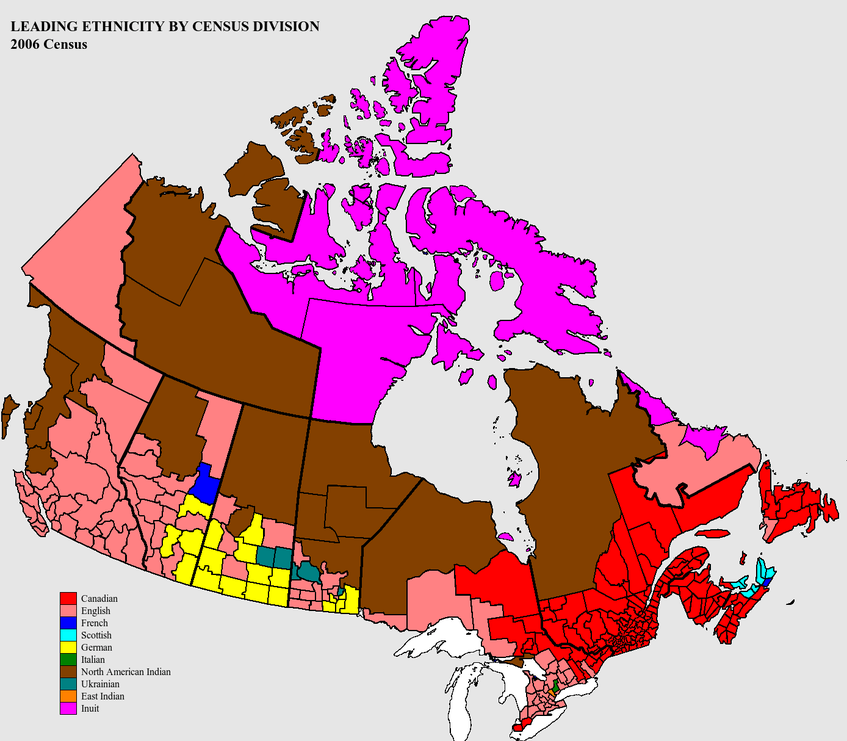I recently stumbled across this map of “Leading Ethnicity by Census Division,” based on the 2006 Canadian census (original on Wikipedia). Maps fascinate me and I thought this one was pretty cool. I thought I’d share a few thoughts, but first the map itself:
Some of my observations:
- there are a lot of immigrants in Toronto — the suburbs there contain the one East Indian and the one Italian mention on the map.
- the Inuit are the most common in Nunavut, which I guess is to be expected, but I guess I assumed they’d be better represented in northern Northwest Territories or in the Yukon.
- I’m surprised that the Yukon comes up as “English” rather than “First Nations” (North American Indian) or “Inuit.”
- I know the Ukrainians from north-central Alberta (perogies…yum!), but they don’t show up there, but rather a strip across eastern Saskatchewan into Manitoba. I hadn’t realized that the Ukrainians had settled over that big an area, but why not?
- Of the two place French showed up, one made sense and the other surprised me. Cape Breton made sense, as that was a French stronghold for many years (centuries). Northern Alberta surprised me - I knew there was some French-speaking presence there, but I didn’t think it would be the largest ethnic group. I’m also surprised “French” didn’t surface in Quebec.
- Quebeckers, most predominately, identify themselves as “Canadian.” I think that bodes well for national unity.
- “Canadian” shows up for the eastern part of Ontario, New Brunswick, Nova Scotia, and Newfoundland - places that have been historically under alternatively English and French control. Areas that have never been under French control, like Alberta and British Columbia, show up as “English.”
- I’m surprised that Newfoundland would come up as “Canadian.” There aren’t a lot of people moving to the island, and only those born there in the last 60 years were even born under a Canadian flag! (Newfoundland was a separate British colony until it join Canadian Confederation in 1949.)
- I wonder if the many ethnicities showing up on the prairies (Manitoba, Saskatchewan, and Alberta) compared with the prominence of “Canadian” further east simply a result of history, or a lack thereof: basically people on the prairies still remember where their grandfathers came from and there hasn’t been as much mixing of communities as have happen further east to complicate the question of ethnicity.
Another interesting realization for me was the difference between “ethnicity” and “race,” which I guess I had considered equivalent beforehand. Wikipedia defines ethnicity as “is a group of people whose members identify with each other, through a common heritage, often consisting of a common language, a common culture (often including a shared religion) and/or an ideology that stresses common ancestry or endogamy.” It further explains “The concept of ethnicity differs from the closely related term race in that ‘race’ refers to grouping based mostly upon biological criteria, while ‘ethnicity’ also encompasses additional cultural factors.”
In all, the ethnicity of “Canadian” is a construct, and likely still in the process of being defined. I guess it plays into the fundamental question of what it means to “be Canadian”: is that a self-identification questions? a combination of geography and history? solely citizenship?

Comments
There are no comments yet. Will you add the first one?